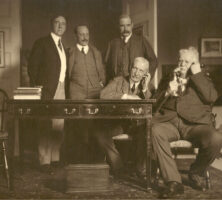A number of significant historical events have occurred in Georgia during the month of January.
1750-1799
1751
On January 1 the British House of Commons, at the request of the Trustees, overturned the ban on slavery in the Georgia colony.
1776
During the Revolutionary War, British forces moved warships onto the Savannah River.
1779
On January 31 British troops captured the city of Augusta.
1785
The Georgia legislature became the first in the nation to approve a charter for a state university, which opened in Athens sixteen years later as the University of Georgia.
1788
First African Baptist Church, one of the oldest African American Baptist churches in North America, was formally established in Savannah.

Photograph by Carl Elmore. Courtesy of Savannah Morning News
Georgia became the fourth state to enter the Union when it ratified the new U.S. Constitution on January 2.
1795
The Yazoo Act (which became known as the Yazoo land fraud) was signed into law.
1850-1899
1861
On the eve of the Civil War, Georgia became the fifth state to secede from the Union on January 19.
1865
As the Civil War drew to a close, Union general William T. Sherman issued his Special Field Order No. 15, which called for the distribution of abandoned southern lands to formerly enslaved African Americans. The order was later revoked by U.S. president Andrew Johnson.
1888
The Jekyll Island Club, a hunting club for wealthy northern industrialists, opened on Jekyll Island.

Courtesy of Georgia Archives.
1892
The University of Georgia played its first football game, against Mercer University.
1900-1949
1903
A deadly tornado tore through Gainesville, killing more than 100 people.
1907
The Court of Appeals of Georgia held its first open session.
1915
The first public telephone call was made from the Jekyll Island Club.

Courtesy of Jekyll Island Museum
1942
The Eighth Air Force, known as the “Mighty Eighth,” was formed in Savannah during World War II.
1950-1999
1957
A group of Atlanta ministers organized the Love, Law, and Liberation (Triple L) Movement to desegregate the city’s buses. That same month the Southern Christian Leadership Conference was officially inaugurated in Atlanta.
1959
A federal district court ruled in favor of the Triple L ministers, ending six decades of segregation on Atlanta’s buses.
1961
The University of Georgia was desegregated with the admission of African American students Hamilton Holmes and Charlayne Hunter.

Courtesy of Atlanta Journal-Constitution.
1973
Andrew Young was elected as Georgia’s first Black congressman since Reconstruction.
1986
Martin Luther King Jr. Day, a national holiday celebrating the legacy of civil rights leader and Atlanta native Martin Luther King Jr., was first observed. Instituted through the efforts of King’s widow, Coretta Scott King, the annual event is held on the third Monday of January.

Courtesy of Atlanta Journal-Constitution.
1987
During the second observance of Martin Luther King Jr. Day, members of the Ku Klux Klan in Forsyth County attacked a small group celebrating the event. In response, civil rights leader Hosea Williams and others organized a demonstration the following week that attracted some 20,000 people from around the country.
1994
John Berendt’s book chronicling a murder in Savannah, Midnight in the Garden of Good and Evil, was published. Since that time “The Book” has been credited with bringing hundreds of thousands of tourists to Savannah.

1997
Former Atlanta Braves pitcher Phil Niekro was elected to the Major League Baseball Hall of Fame.
January Birthdays
January 28, 1671 William Stephens, Georgia colony president
January 14, 1783 Wilson Lumpkin, Georgia governor
January 28, 1791 Mary Telfair, philanthropist
January 17, 1796 William Washington Gordon, business leader
January 1, 1804 James Walker Fannin Jr., military leader
January 6, 1805 Charles Jones Jenkins, Georgia governor
January 20, 1812 Raphael Moses, peach industry pioneer
January 14, 1814 Alfred Austell, business leader
January 8, 1821 James Longstreet, Civil War officer
January 8, 1831 John Stith Pemberton, Coca-Cola inventor
January 3, 1836 Young John Allen, Methodist missionary
January 29, 1845 Charles Crisp, politician
January 21, 1846 Nathaniel E. Harris, Georgia governor
January 31, 1861 Julia Flisch, education advocate
January 4, [1872] Selena Sloan Butler, education advocate
January 15, 1874 William O. Golding, artist
January 29, 1878 Walter F. George, politician
January 13, 1887 Charles Nabell, musician
January 18, 1892 Oliver Hardy, actor
January 26, 1900 Clayton McMichen, musician
January 8, 1904 “Tampa Red” Whittaker, musician
January [4 or 14], 1905 Sterling Holloway, actor
January 8, 1911 Butterfly McQueen, actor
January 29, 1912 Mills B. Lane Jr., business leader
January 7, 1913 Johnny Mize, baseball player
January 13, 1915 Raymond G. Davis, military leader
January 14, 1916 John Oliver Killens, writer
January 31, 1919 Jackie Robinson, baseball player
January 15, 1920 Dot Kirby, golfer
January 1, 1923 W. W. Law, civil rights activist
January 5, 1926 Hosea Williams, civil rights activist
January 23, 1928 World Carpets founder Shaheen Azeez Shaheen
January 12, 1929 Turner Cassity, writer
January 15, 1929 Martin Luther King Jr., civil rights activist
January 3, 1935 Millard Fuller, Habitat for Humanity founder
January 9, 1936 Anne Rivers Siddons, writer
January 20, 1939 Paul Coverdell, politician
January 14, 1940 Julian Bond, civil rights activist
January 4, 1942 Precious Bryant, musician
January 19, 1947 Paula Deen, restaurateur
January 15, 1955 Anthony Grooms, writer
January 6, 1957 Nancy Lopez, golfer
January 4, 1960 Michael Stipe of R.E.M., musician
January 12, 1960 Dominique Wilkins, basketball player
January 28, 1960 Mike Luckovich, cartoonist






